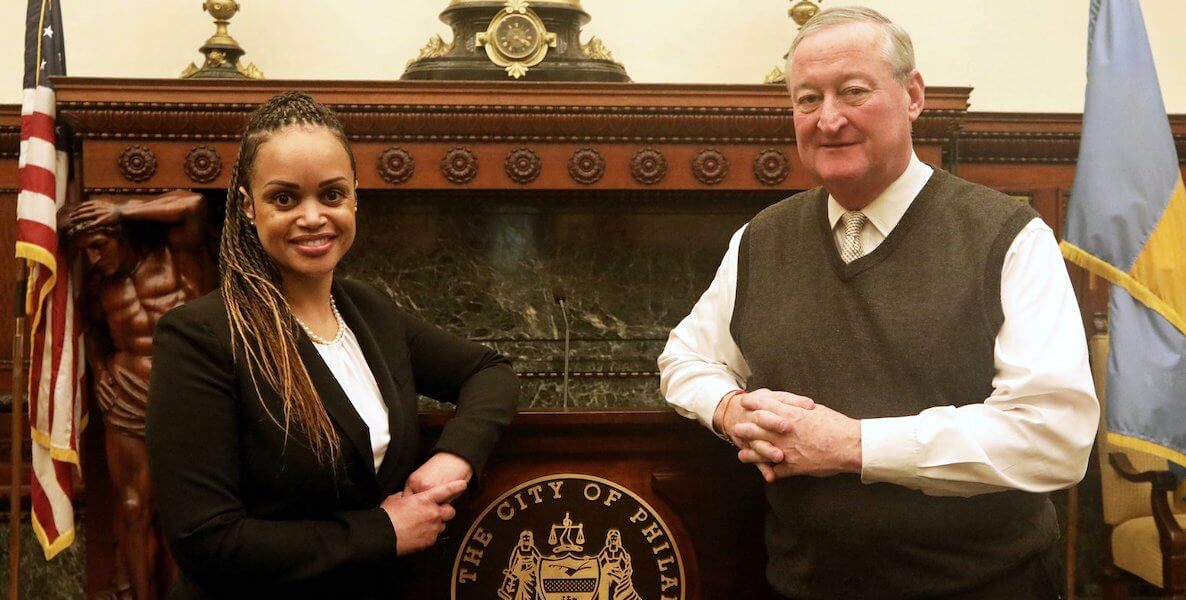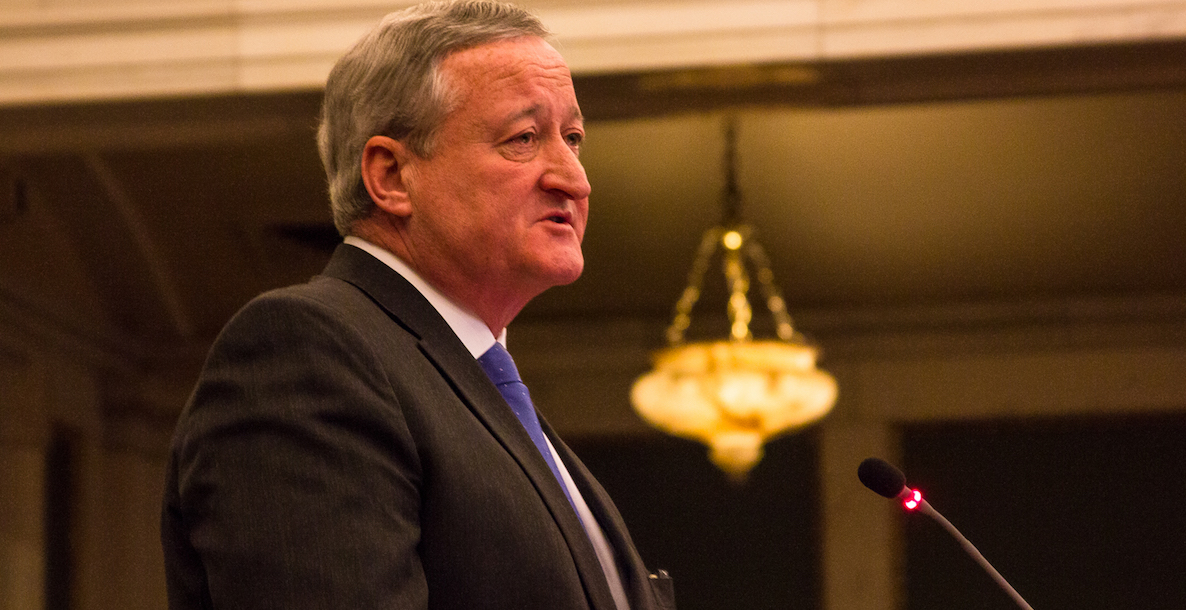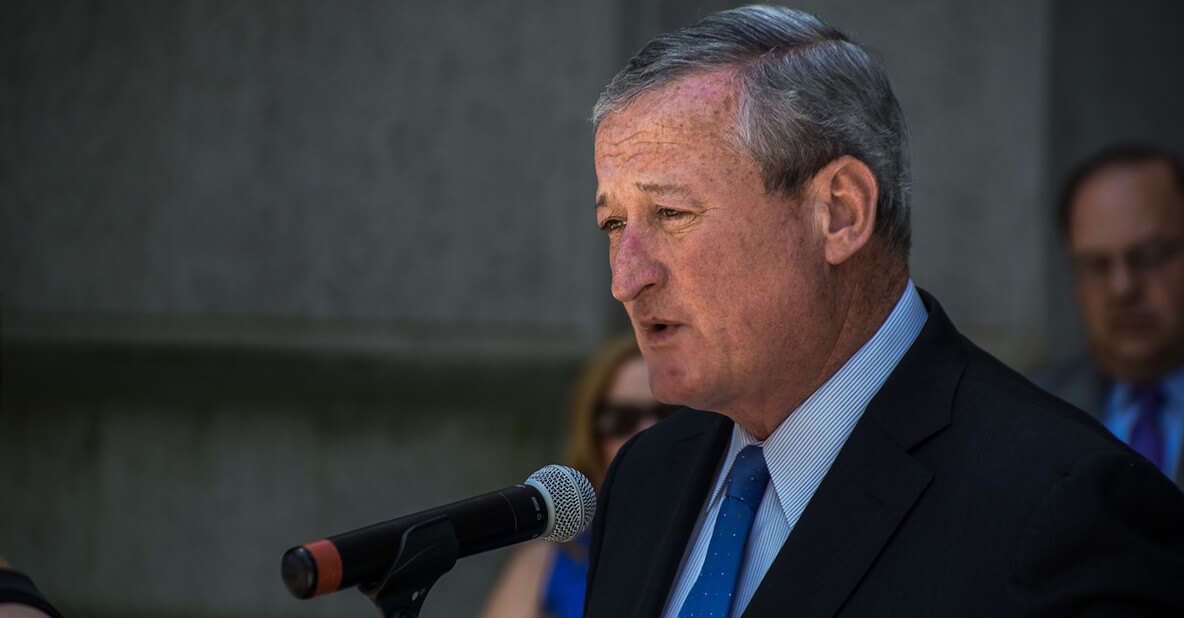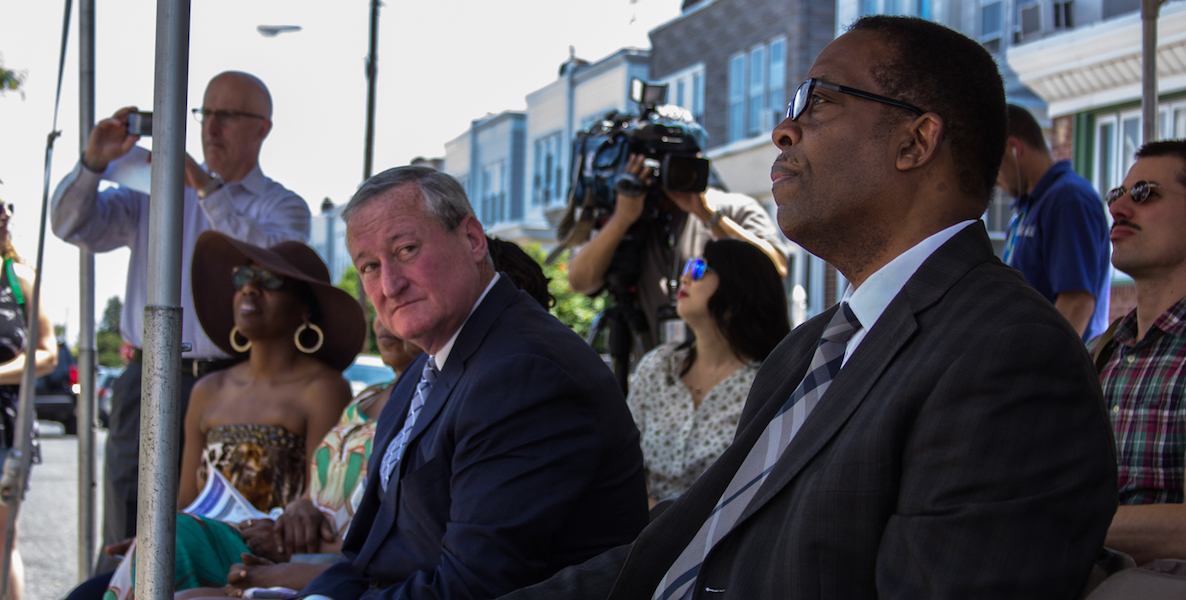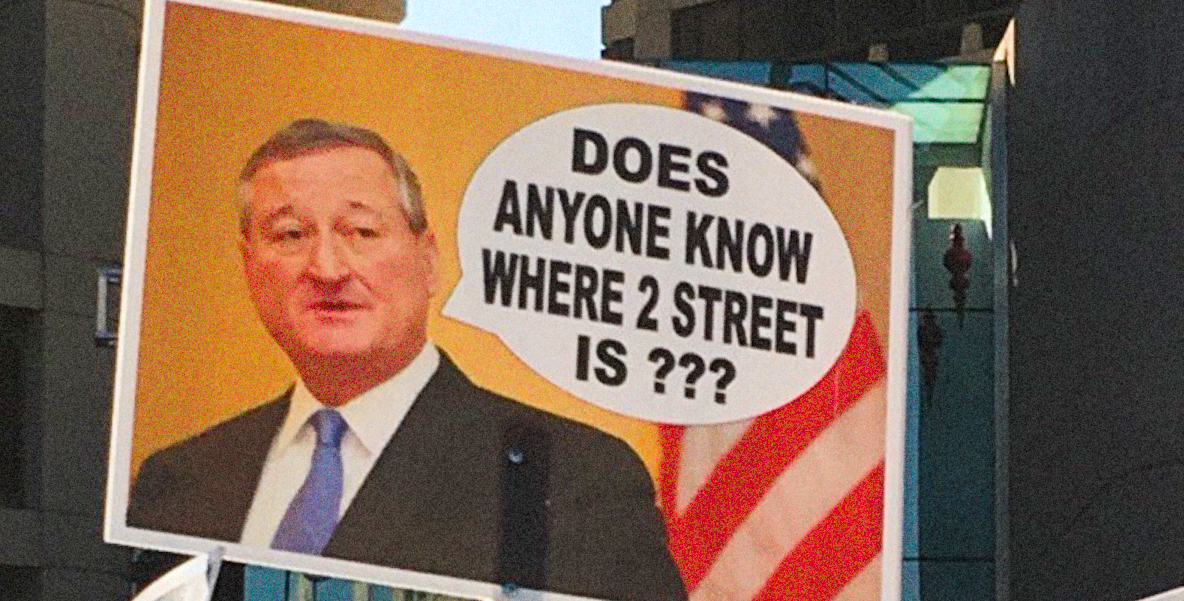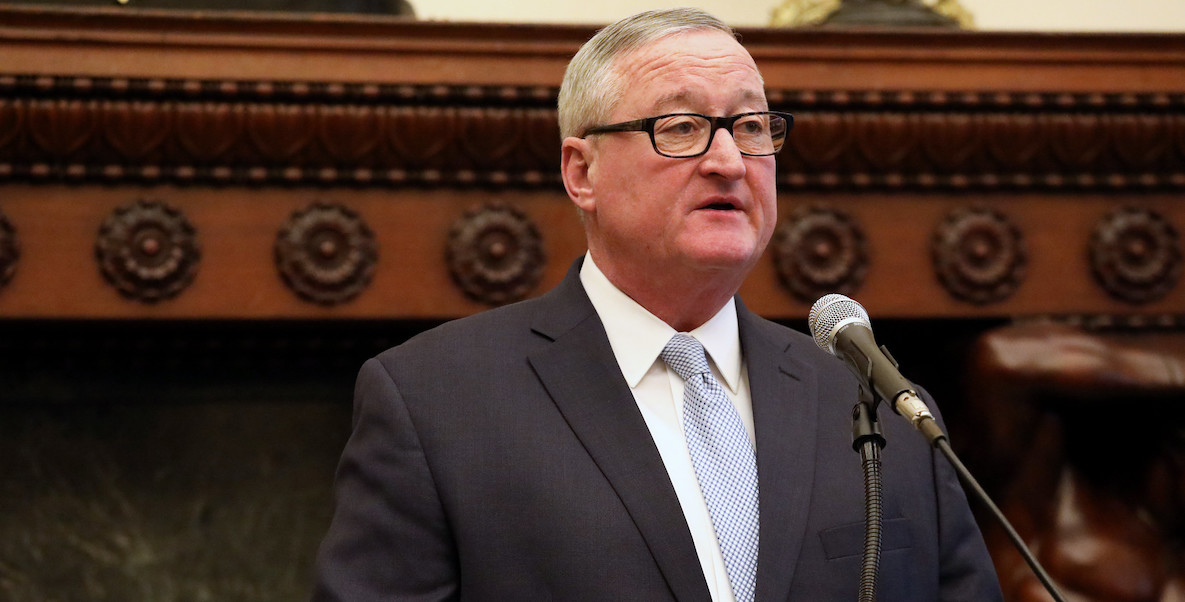For a too-brief moment, it was an intoxicating notion. Maybe Mayor Jim Kenney, freed from crass political calculation in a second term, would be bolder, more of a leader than a finger-to-the-wind political caricature. Liberated, he’d give up his dour, shoulder-shrugging ways, and instead paint an inspiring vision and govern with an eye toward confronting our deeply-ingrained challenges—the interests of the permanent establishment be damned.
![]() After all, there was his hiring of the impressive Danielle Outlaw as police commissioner, an outsider, despite the preferences of the police union and many of those inside a department badly in need of reform. Then there was the announcement in his inaugural address for—gasp!—citywide street sweeping, which would end Filthadelphia’s dubious distinction as the only big city in America without such a program, owing largely to South Philadelphians’ disinclination to move their cars. Maybe Second-Term Jimmy was no longer afraid to tell a neighborhood that, for the health of their neighbors, they’d have to occasionally give up a good parking spot. “If you don’t want to move your car—tough,” he told the press after his speech.
After all, there was his hiring of the impressive Danielle Outlaw as police commissioner, an outsider, despite the preferences of the police union and many of those inside a department badly in need of reform. Then there was the announcement in his inaugural address for—gasp!—citywide street sweeping, which would end Filthadelphia’s dubious distinction as the only big city in America without such a program, owing largely to South Philadelphians’ disinclination to move their cars. Maybe Second-Term Jimmy was no longer afraid to tell a neighborhood that, for the health of their neighbors, they’d have to occasionally give up a good parking spot. “If you don’t want to move your car—tough,” he told the press after his speech.
A good barometer of political courage, after all, is whether an elected official is willing to tell supporters what they don’t want to hear. That wasn’t First-Term Jimmy’s profile, but maybe that would change now?
Well, a guy can dream. The first week of the new year has, in at least three telling examples, refuted the naive notion that the small-ball game planning and Trump-like spin from City Hall these last four years might be in jeopardy. We’ve met the new boss, and he seems an awful lot like the old boss. Let’s walk through them:
The Pocket Vetos
On the last day of the year, Kenney failed to sign, and thus allowed to expire, six bills passed by City Council. Two of them would have addressed the very issue Kenney has paid stirring lip service to: Our worst-in-the-nation poverty rate.
One would have raised the amount of property value that is untaxed from $45,000 to $50,000 for eligible homeowners in a city that—under Kenney—has been addicted to mysterious and unjust property tax hikes. The total cost of increasing the exemption? $10 to $15 million annually.
More egregious was Kenney’s pocket veto of Allan Domb’s wage tax rebate bill for low-income Philadelphians. Turns out, Philadelphia taxes its poorest residents at the highest rate in the nation—yet another dubious distinction.
Domb’s bill would have refunded about $800 annually to the poorest working Philadelphians, a total that would jump to $1,300 a year in 2023 once the 1.5 percent of the wage tax dedicated to paying off the bonds that funded the Pennsylvania Intergovernmental Cooperation Authority comes off the books. “We shouldn’t be filling the city coffers on the back of people earning poverty wages…It’s just not right,” Domb said upon the bill’s 17-0 passage in Council.
Maybe it’s time to try a different type of leadership, one that swings for the fences, one that engages Philadelphia in an invigorating common project. That’s the kind of approach Danielle Outlaw talked about in her press conference. He was there, so one can only hope her new boss was listening.
Mayor Kenney has rightly called Philadelphia’s poverty rate an “embarrassment,” but his actions have been far from Marshall Plan-like. The city’s anti-poverty office has long been a bureaucratic sinkhole and, compared to peer cities, our approach to combating the scourge of poverty under Kenney has not only been plodding, but also uninformed by pro-growth strategies.
So why not embrace any idea that puts some scratch back into the pockets of those who have the least? To hear the administration tell it, they’ve suddenly discovered the notion of fiscal responsibility. The hit to the city budget of signing the property and wage tax relief bills would have been around $40 million, less than one percent of the annual budget. Sounds like small potatoes for a mayor who has increased spending by $1 billion per year—the largest four-year spending spree in city history.
So if it wasn’t really the budgetary and administrative burden, what was it? I reached out to Domb to find out. He still sounded stunned. “When [Mayoral Chief of Staff] Jim Engler called me on New Year’s Eve to tell me the mayor wouldn’t sign it, I couldn’t believe it,” he said. “I still don’t understand. You want to fight poverty? This is how. Putting cash back in the pockets of 150,000 of the 382,000 people in poverty—working people. $800 a year might not sound like much, but it is if you’re making $25,000 a year.”
Domb cites all the support his bill garnered from experts, including The Reinvestment Fund and Benefits Data Trust, both of whom saw the stimulative effects of such a refund. “This would be money that goes right back into the local economy in neighborhoods,” Domb said. “They’re not putting this money into 401Ks.”
I pressed Domb on why the mayor wouldn’t sign his bill. “The only answer is, I don’t know,” he repeated.
This is just conjecture, of course, but here’s a thought: Don’t discard the power of ego and political pettiness in Philadelphia. These weren’t Jim Kenney’s ideas, and that one of them belonged to Domb couldn’t have sat well. Domb’s calls for fiscal sanity over the unreconciled bank accounts and missing millions in city funds prompted expletive-laden rage from the mayor, to whom all politics appears to be personal. (Remember that the mayor discontinued his predecessor’s successful Focused Deterrence policing pilots likely because his predecessor’s fingerprints were all over them). Domb—saying the wage tax refund is the most important thing he’s done since joining Council—vows to reintroduce the bill in the coming days.
Gun Violence-Funding Follies
Danielle Outlaw was intimately involved with Oakland’s successful interventions in cutting its 2012 worst-in-the-nation gun violence in half, so it was especially ironic that, a week after naming her to be Philly’s top cop, the Kenney administration took an action that flies directly in the face of the lessons of Oakland. Instead of following the bold footprints of that city, Kenney has doubled down on the failed status-quo policies that have given us our nightly narrative of chalk outlines and body bags.
On the surface, it may appear that there’s nothing wrong with announcing, as Kenney did earlier this week, the city’s second round of funding for community-based organizations designed to “prevent and reduce gun violence.” More than 50 groups that provide mentoring and career skill-building, organize sports leagues and connect returning citizens to their communities will receive $1 million in funding. There’s only one problem: Such funding, well-intentioned though it is, does not reduce gun violence—at least not anywhere near the urgent timetable demanded by our current crisis.
This is just conjecture, of course, but here’s a thought: Don’t discard the power of ego and political pettiness in Philadelphia. These weren’t Jim Kenney’s ideas, and that one of them belonged to Domb couldn’t have sat well.
That was the message from David Muhammad, executive director of the National Institute for Criminal Justice Reform, who wowed the crowd at our Ideas We Should Steal Festival last month. Muhammad was one of the architects of the Oakland turnaround, and many others just like it, and he reports that many cities make the same mistake: ignoring the self-evident dictum that “Your actions must be aligned with your desired outcomes.” If you want to reduce gun violence right now, Muhammad says, “a mentoring program for middle schoolers is great—but it will never get you gun violence reduction in 12 months.”
Instead, Muhammad outlines a bold, intentional and focused strategy—the same that Outlaw referenced in her press conference. We outlined it here. Tellingly, Theron Pride, Kenney’s senior director of Violence Prevention Strategies and Programs, concedes that much of the city’s grassroots spending is not addressing the short-term need to lower the gun violence rate that Muhammad and Outlaw herald. Instead, he says, the Kenney administration spending is aimed toward helping those doing the work on the ground feel supported and part of the conversation.
That may be admirable, but it’s also a classic case of mission creep. How distressing is it that, even as Kenney boldly appoints Outlaw, his administration is announcing yet more of the same old, same old?
How about that street-sweeping?
First-Term Jimmy had a penchant for making bold assertions, and then either not living up to them or trotting out his lieutenants to “walk them back”—a relatively new euphemistic political term of art. (In the not-so-old old days, statements that had to be “walked back” or “cleaned up” were often referred to as “lies.”)
Think of it. Candidate Jimmy in 2015 was going to institute reform-minded zero-based budgeting, end stop-and-frisk, and institute street-sweeping. None of it ever happened. Now comes that bold announcement: Street-sweeping will triumphantly return. Uh…check that. Within hours of Kenney’s comments, there was Managing Director Brian Abernathy doing the walk-back: Turns out, Kenney’s no-nonsense call might not apply to all neighborhoods. And the street sweeping that does get done? Don’t expect the program to fully roll out until…2023. Wouldn’t it be nice if, for once, we got a sense of urgency coming from City Hall around problem-solving?
How distressing is it that, even as Kenney boldly appoints Outlaw, his administration is announcing yet more of the same old, same old?
The decision to hire Outlaw—seen widely as a “legacy” move—led many to wonder whether Second-Term Jimmy would govern by tackling the big stuff. After all, he’s spent prodigiously, but to what return? We still lead the nation in poverty, we’re still creating the wrong kinds of jobs in order to compete with peer cities and the suburbs, we still have an exploding murder rate and abysmal clearance rate (in six out of 10 cases, you can literally get away with murder in Philadelphia).
Maybe it’s time to try a different type of leadership, one that swings for the fences, one that engages Philadelphia in an invigorating common project. That’s the kind of approach Danielle Outlaw talked about in her press conference. He was there, so one can only hope her new boss was listening.
Photo by Samantha Madera / City of Philadelphia


